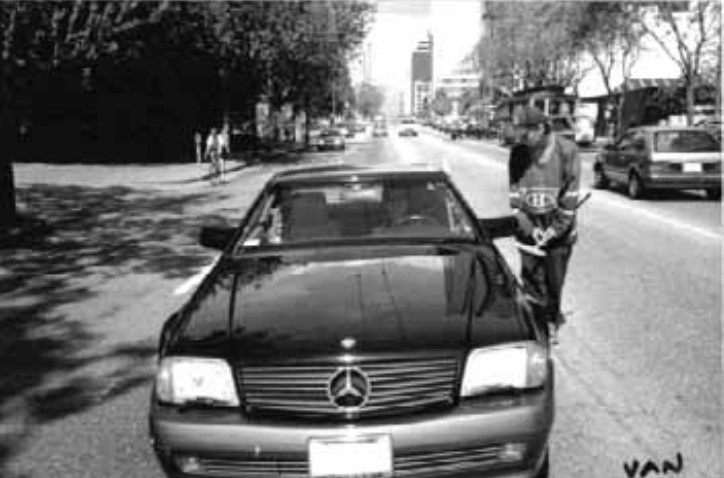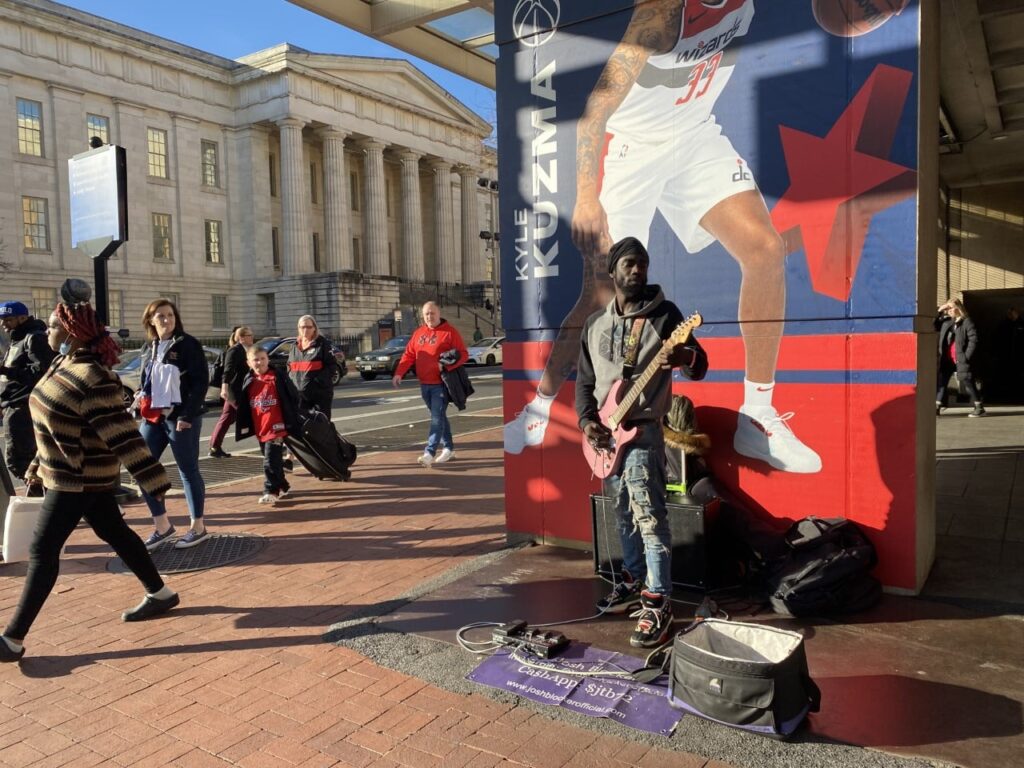Economic Profiling Treats Homeless People as Criminals
Affluent college students set up tents, cardboard boxes and crates on private property, housed in their make-shift “shanty town,” protesting the plight of homeless people. Living outdoors for a night – food, toilets and police protection readily available – this camping offers protection for a night spent in full view of the public.
A ragtag group of people huddles under a highway bridge, cars thundering overhead, setting up tents and a few belongings. They are waiting out a storm. It will likely be a few days before the rain finally stops, so they are grateful for the protection and a measure of privacy in a public place.
The first group will pass the night in relative calm after the TV cameras leave. The second group will be invaded by police issuing citations before forcing them back into the storm to look for some other shelter, possibly leading to more tickets. Both situations describe people creating their own shelter. The reason they are treated so differently is economic profiling. Like other forms of profiling – targeting individuals for suspicion because of their race, faith or nationality – economic profiling uses the appearance of poverty as a basis of suspicion.
Economic profiling is also used to create laws and ordinances that intentionally target economically disadvantaged people, frequently homeless, for the stated reason of improving public safety. The problem is that this profiling doesn’t work, and it sanctions discrimination against people who are different, feeding an irrational fear of “homeless people.”
Beautiful People Can Be Homeless, Too.
If you saw David Letterman or Jim Carrey sleeping in a car, wrapped in a sleeping bag against the cold, would you call the police and complain that he made you feel unsafe while walking your dog? Would Halle Berry, dressed in jeans and a T-shirt on a bus-stop bench, prompt you to tell a cop that a prostitute was soliciting in a place where children gather? Would those people inspire feelings of fear, disgust or self-righteous indignation?
Of course not. You’d look for a piece of paper for an autograph and get ready to take a photo. The only difference between Letterman, Carrey, Berry and other people on the street is that they managed to move beyond homelessness and become rich. When they were homeless, however, a call to the cops would have been a more likely outcome, because we treat homelessness as a crime.
In 2007 approximately 3.6 million people were homeless at some time in North America, according to a number of non-profit organizations. “Homeless” is defined in a variety of ways, so it is impossible to paint a uniform picture of what this reality looks like. But the numbers show that homelessness has reached epidemic proportions. The popular response is punishment.
“It’s illegal to be homeless in this country. We have a form of economic profiling similar to racial profiling,” says Michael Stoops, director of community organizing for the National Coalition for the Homeless in Washington, D.C. “It’s a major problem, and it’s not going to go away unless citizens demand that their cities do something about it in a positive manner.”
This is true across all of North America.
People who live on the street or rely on shelters for temporary housing are on the outside of society because they appear to do things that are inappropriate. The law treats certain necessary behaviors as “anti-social” when they are performed in public. Criminal citations are often issued to homeless people for activities that everyone else does indoors or on private property: earning income, sleeping, eating, going to the bathroom or sitting down to rest.
Stoops calls these “quality of life” behaviors. Some of the laws barring them are cited in Homes Not Handcuffs: The Criminalization of Homelessness in U.S. Cities, a 2009 report by the National Coalition for the Homeless and the National Law Center on Homelessness and Poverty. They include acts such as bathing, sleeping, and urinating in public as well as panhandling and begging.
Using a toilet is a universal need. You might think a person could just use the facilities in a public place such as a library or subway or a shelter. But that ignores facts that only become obvious when you are living on the street. Many public places can be too far away to walk to — assuming you can walk — and are locked much of the day. Many shelters have restricted access; not anyone can just wander in when they want. And businesses rarely allow people who are not customers to use their facilities.
Housing is Cheaper
There are no comprehensive studies proving that the criminalization approach to homelessness improves public safety. Advocates for the homeless, however, cite scientific research and anecdotal evidence to prove that addressing the root causes of homelessness — not the behaviors related to it — can have a positive long–term impact for the community as well as the individuals.
Homes Not Handcuffs cites a study in the Journal of the American Medical Association in which Seattle researchers concluded that it’s “cheaper to provide supportive housing to chronically homeless individuals with severe alcohol problems than to have them live on the streets. Researchers designed a study to evaluate the effect of a Housing First intervention for chronically homeless individuals with severe alcohol problems on the use and costs of services,” the report says.
“According to the study, the median costs of Housing First participants before the study were $4,066 per person per month. When participating in the Housing First program, median monthly costs decreased to $1,492 per person per month after six months and $958 after 12 months.”

Some cities make an effort to balance the criminalization approach with efforts to assist individuals in connecting with service providers. The uneven application of harsh enforcement is illustrated in Colorado. Denver’s Road Home — a 10-year plan to end homelessness — includes criminalization ordinances, but the city “adopted a policy of training officers on how to do outreach to the homeless,” says Tim Covi, editor of the Denver VOICE.
Law enforcement is expected to direct people to assistance rather than issue tickets right away. While the homeless on the Downtown Business Improvement District say they have been treated with respect, others aren’t so fortunate.
“Particularly along the Platte River and Cherry Creek areas, where the homeless often sleep at night and by law are not permitted to sleep, the Denver VOICE has received accounts of people’s possessions being discarded after they were roused in the morning and told to leave the area,” Covi says. “We have been told by at least five homeless people that the police make regular stops early in the morning on the Platte River and tell people to leave, and that if they’re found there again, they’ll be ticketed or arrested.”
Scarce financial resources and public sentiment means advocates for the homeless have the added responsibility of educating the public about the steps necessary to end homelessness. Most large cities have more homeless people than shelter beds and even fewer services to address the root causes of the problem – mental health issues, addiction, job training, high unemployment rates, hiring practices that bar individuals with criminal records. Success stories are hard to come by.
Make Them Wear Signs
Unfortunately, failed programs tend to get the most attention.
“What happens when a city proposes some new initiative to solve the homeless problem — and this is in a negative way, to criminalize homelessness — it passes,” says Stoops. “The chamber of commerce, the police department, the business community will say that this new anti-panhandling program is working. And then other cities hear about it. Cities are actually very lazy. They will copy and pass this same, exact panhandling ordinance that was passed in Cincinnati.”
Indianapolis, Ind., and other municipalities are currently considering the ordinance Stoops refers to.
“In 2003 Cincinnati City Council passed an ordinance requiring panhandlers to obtain licenses from the health department,” says Gregory Flannery, editor of Streetvibes. “Teachers, nurses, activists and others registered as panhandlers in an expression of solidarity. The Greater Cincinnati Coalition for the Homeless (parent organization of Streetvibes) filed a civil rights lawsuit in federal court alleging the ordinance was a violation of the First Amendment, which guarantees the right to free speech. In settling the lawsuit, the city, the Homeless Coalition and Downtown Cincinnati Inc. (DCI) agreed to create an outreach position at DCI, whose job includes connecting panhandlers with social services.”
Advocates are working to change the views of lawmakers while simultaneously finding ways to get around the laws until they are removed.
‘Everyone Has The Right’
At a time when millions are being donated by private citizens and government to offer relief to 1.9 million Haitians left homeless by the recent earthquake, North Americans turn a blind eye to the policies that punish almost twice that many people in the same circumstance.
But change is possible.
Both Canada and the United States have signed and ratified the Universal Declaration of Human Rights, but both have failed to universally incorporate its principles into their laws. The non-binding United Nations (U.N.) declaration opens with a preamble recognizing “the inherent dignity and … equal and inalienable rights of all members of the human family is the foundation of freedom, justice and peace in the world.” In 1948 the U.N. General Assembly adopted this declaration as a “common standard of achievement for all peoples and all nations.”
The recognition that everyone — regardless of any distinction including an “other status,” such as homelessness — is “born free and equal in dignity and rights” of life, liberty and security of person, is detailed in admonitions to prohibit slavery, torture, arbitrary arrest and a host of other behaviors that the United States and Canada routinely condemn as deplorable in other countries. The problem is that we refuse to do as we say.
Laws that criminalize homelessness routinely violate the Universal Declaration of Human Rights. Restricting the movement of people in specific locations violates Article 13: “Everyone has the right to freedom of movement and residence within the borders of each state.” Confiscating and disposing of personal property because it happens to be on public land violates Article 17: “Everyone has the right to own property alone as well as in association with others. No one shall be arbitrarily deprived of (his/her) property.” Perhaps the most egregious violation of all is the blatant disregard for Article 25: “Everyone has the right to a standard of living adequate for the health and well–being of himself and of his family, including food, clothing, housing and medical care and necessary social services, and the right to security in the event of unemployment, sickness, disability, widow–hood, old age or other lack of livelihood in circumstances beyond his control.”
Homelessness has become a crime, but homeless people are the victims, not the perpetrators. Laws that worsen their plight aggravate the offense. Just as mental illness, sexual abuse and addiction are conditions that call for help — not prosecuting victims — homelessness deserves a response rooted in compassion, fiscal sense and respect for international law. Helping homeless people is less expensive than jailing them. But more important, helping homeless people is the right thing to do. Jailing them for being homeless is wrong.
Reprinted from NASNA
© Street News Service: www.street-papers.org






